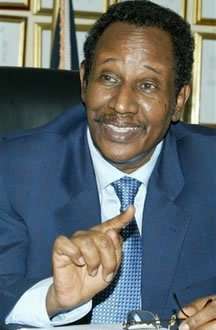Dahir Riyale Kahin
Dahir Rayale Kahin (Somali: Dahir Rayale Kahin, Arabic: ضاهر ريالي كاهن) (born 12 March 1952) is a Somali politician who was President of Somaliland from 2002 to 2010. He previously served as a senior officer in the National Security Service of Somalia, and he was Vice President of Somaliland from 1997 to 2002.
Dahir Rayale Kahin طاهر ريالي كاهن | |
|---|---|
 | |
| 3rd President of Somaliland | |
| In office 3 May 2002 – 27 July 2010 | |
| Vice President | Ahmed Yusuf Yasin |
| Preceded by | Muhammad Haji Ibrahim Egal |
| Succeeded by | Ahmed Mohamed Mohamoud |
| 4th Vice President of Somaliland | |
| In office 16 May 1997 – 3 May 2002 | |
| President | Muhammad Haji Ibrahim Egal |
| Preceded by | Abdirahman Aw Ali Farah |
| Succeeded by | Ahmed Yusuf Yasin |
| Personal details | |
| Born | 12 March 1952 Quljeed, British Somaliland |
| Political party | United Peoples' Democratic Party |
| Spouse(s) | Huda Barkhad |
Personal life
Kahin was born in the town of Quljeed, situated in the northwestern Awdal region of Somaliland. He hails from the Jibreel Younis sub-clan of the Gadabuursi clan. He was educated in Amoud, and was later trained in Mogadishu.
Career
Early career
Kahin's previous posts included a diplomatic position at the Somali Embassy in Djibouti.
In the last years of the Siad Barre government, during the 1980s, Kahin was the highest-ranking National Security Service (NSS) officer in Berbera.[1]
From 1997 to 2002, Kahin served as the Vice President of Somaliland.
President of Somaliland
On 3 May 2002, Kahin became the third President of Somaliland, after the death of the autonomous region's President Muhammad Haji Ibrahim Egal. Kahin later won the elections on 14 April 2003, representing the Ururka Dimuqraadiga Umada Bahawday (UDUB), or United Democratic People's Party. He was sworn into office on 16 May.
In 2008, Kahin established by decree new regions and districts, which drew criticism.[2] Regions and districts in Somaliland are not just an instrument for the organisation of local government, they are also used as electoral districts. Kahin's move was considered by several to have motives rooted in electoral and clan-politics. Moreover, as these new regions and districts were never geographically delimitated, they argued that he saddled the region with a legacy that hampers the efficient organisation of local government to this day.[3]
Throughout his tenure as President of Somaliland, Kahim sought to maintain peace and tranquility in the region. His administration contributed to various state-building and institutional development initiatives. In terms of democratization, his government also successfully organized local council elections, parliamentary elections, and two presidential elections. Additionally, Kahin is noted for having peacefully transferred power to his successor in office, President Ahmed Mohamed Mohamoud.
References
- Human Rights Watch (Organization), Chris Albin-Lackey, Hostages to peace: threats to human rights and democracy in Somaliland, (Human Rights Watch: 2009), p.13.
- Somaliland President Creates New Regions and Districts, Hiiraan Online, March 24, 2008. Accessed on 5 February 2015.
- See: Somaliland Local Government Re‐organisation through Presidential Decrees in an Election Year, by Ibrahim Hashi Jama, Somalilandlaw.com, 7 April 2008. Accessed on 5 February 2015.
External links
- (Brief history of Somaliland)
- (waayaha.net)
- dahir riyale on Facebook
| Political offices | ||
|---|---|---|
| Preceded by Abdirahman Aw Ali Farah |
Vice President of Somaliland 1997–2002 |
Succeeded by Ahmed Yusuf Yasin |
| Preceded by Muhammad Haji Ibrahim Egal |
President of Somaliland 2002–2010 |
Succeeded by Ahmed Mahamoud Silanyo |